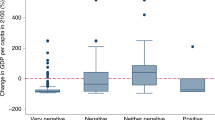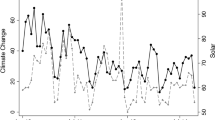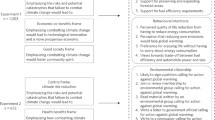Abstract
Geoengineering could be taken by the public as a way of dealing with climate change without reducing greenhouse gas emissions. This paper presents the results of survey experiments testing whether hearing about solar radiation management (SRM) affects people’s support for taxing polluting energy and/or their trust in climate science. For a nationally representative sample of respondents in Britain, I found that receiving a brief introduction to SRM had no impact on most people’s willingness to pay taxes, nor on their trust in climate science. Hearing about this form of geoengineering therefore appears unlikely to erode support for emissions reductions. Specifically for political conservatives asked first about paying taxes, moreover, hearing about SRM increased trust in climate science. These and other results of the experiments also provide partial support for the theory that conservatives’ lower trust in climate science generally stems from their aversion to regulatory action by the state.

Similar content being viewed by others
Notes
Geoengineering has nonetheless been mentioned in the news, and some respondents will already have known something about it.
Introductions to different geoengineering techniques could have different impacts on public support for greenhouse gas emissions reductions. That this study only examines how public opinion responds to brief introductions of two particular techniques is a limitation, and future studies should test the impacts of others.
Examples are the World Values Surveys/European Values Studies and the International Social Survey Programme.
Trust and beliefs are tightly linked, as influential definitions of trust show (see Nannestad 2008).
See: http://manifesto-project.wzb.eu. Benoit and Laver (2007) provide a longer discussion of these three parties’ relative placements on a left-right scale, concluding that at some times, in some ways, the Liberal Democrats have fallen to the left of Labour in terms of their policy agenda—and they have often had a stronger focus on environmental protection.
These probabilities therefore quantify how confident we can be that the estimated positive/negative relationship is really positive/negative.
Other than for non-voters, the interaction effects in Model T3 are more negative than the base effect (for Conservatives) is positive. This implies that if anything hearing about geoengineering reduces the trust of most non-Conservatives. But the magnitude of this effect is miniscule.
95 % Bayesian credible intervals: 39–67 % and 60–81 %, respectively.
References
Angel R (2006) Feasibility of cooling the Earth with a cloud of small spacecraft near the inner Lagrange point (L1). PNAS 103(46):17184–17189
Bellamy R, Hulme M (2011) Beyond the tipping point: understanding perceptions of abrupt climate change and their implications. Weather Clim Soc 3:48–60
Bellamy R, Chilvers J, Vaughan NE, Lenton TM (2013) ‘Opening up’ geoengineering appraisal: multi-criteria mapping of options for tackling climate change. Glob Environ Chang 23:926–937
Bellamy R, Chilvers J, Vaughan NE (2016) Deliberative Mapping of options for tackling climate change: citizens and specialists ‘open up’ appraisal of geoengineering. Public Underst Sci 25(3):269–286
Benoit K, Laver M (2007) Estimating party policy positions: comparing expert surveys and hand-coded content analysis. Elect Stud 26(1):90–107
Campbell TH, Kay AC (2014) Solution aversion: on the relation between ideology and motivated disbelief. J Pers Soc Psychol 107(5):809–824
Cao X, Milner HV, Prakash A, Ward H (2014) Research frontiers in comparative and international environmental politics: an introduction. Comp Pol Stud 47(3):291–308
Carrico AR, Truelove HB, Vandenbergh MP, Dana D (2015) Does learning about climate change adaptation change support for mitigation? J Environ Psychol 41(1):19–29
Corner A, Pidgeon N (2014) Geoengineering, climate change scepticism and the ‘moral hazard’ argument: an experimental study of uk public perceptions. Phil Trans R Soc A 372:20140063
Corner A, Pidgeon N, Parkhill K (2012) Perceptions of geoengineering: public attitudes, stakeholder perspectives, and the challenge of ‘upstream’ engagement. Wiley Interdiscip Rev Clim Chang 3:451–466
Corner A, Parkhill K, Pidgeon N, Vaughan NE (2013) Messing with nature? Exploring public perceptions of geoengineering in the UK. Glob Environ Chang 23:938–947
Hadfield J (2010) MCMC methods for multi-response generalised linear mixed models: the MCMCglmm R Package. J Stat Softw 33:1–22
Howell RA, Capstick S, Whitmarsh L (2016) Impacts of adaptation and responsibility framings on attitudes towards climate change mitigation. Clim Chang 136:445–461
Hulme M (2012) Climate change: climate engineering through stratospheric aerosol injection. Prog Phys Geogr 36(5):694–705
Hulme M (2014) Can science fix climate change? A case against climate engineering. Polity Press
Ipsos MORI (2010) Experiment earth? Report on a Public Dialogue on Geoengineering. Report on a public dialogue conducted for the Natural Environment Research Council (NERC)
Jamieson D (1996) Ethics and intentional climate change. Clim Chang 33:323–336
Jones MD (2011) Leading the way to compromise? Cultural theory and climate change opinion. PS Politic Sci Politic 720–725
Kahan DM, Peters E, Wittlin M, Slovic P, Ouellette LL, Braman D, Mandel GN (2012) The polarizing impact of science literacy and numeracy on perceived climate change risks. Nat Clim Chang 2:732–735
Kahan DM, Jenkins-Smith H, Tarantola T, Silva CL, Braman D (2015) Geoengineering and climate change polarization: testing a two-channel model of science communication. Ann Am Acad Pol Soc Sci 658(1):192–222
Keith D (2013) A case for climate engineering. MIT Press
Keith DW, Parson E, Morgan MG (2010) Research on global sun block needed now. Nature 463:426–427
Lin AC (2013) Does geoengineering present a moral hazard? Ecol Law Quart 40(3):673–712
Macnaghten P, Szerszynski B (2013) Living the global social experiment: an analysis of public discourse on solar radiation management and its implications for governance. Glob Environ Chang 23:465–474
Malka A, Krosnick JA, Langer G (2009) The association of knowledge with concern about global warming: trusted information sources shape public thinking. Risk Anal 29(5):633–647
Mercer AM, Keith DW, Sharp JD (2011) Public understanding of solar radiation management. Environ Res Lett 6:044006
Millard-Ball A (2012) The Tuvalu Syndrome: can geoengineering solve climate’s collective action problem? Clim Chang 110:1047–1066
Nannestad P (2008) What have we learned about generalized trust, if anything? Annu Rev Polit Sci 11:413–436
National Academy of Sciences (2015) Climate intervention: carbon dioxide removal and reliable sequestration. National Academies Press, Washington, DC
Nawrotzki RJ (2012) The politics of environmental concern: a cross-national analysis. Organ Environ 25(3):286–307
Parry IWH, Norregaard J, Heine D (2012) Environmental tax reform: principles from theory and practice. Ann Rev Resour Econ 4:101–283
Parson EA, Keith DW (2013) End the deadlock on governance of geoengineering research. Science 339:1278–1279
Pidgeon N, Corner A, Parkhill K, Spence A, Butler C, Poortinga W (2012) Exploring early public responses to geoengineering. Phil Trans R Soc A 370:4176–4196
Pidgeon N, Parkhill K, Corner A, Vaughan N (2013) Deliberating stratospheric aerosols for climate geoengineering and the spice project. Nat Clim Chang 3:451–457
Rayner S, Heyward C, Kruger T, Pidgeon N, Redgwell C, Savulescu J (2013) The Oxford principles. Clim Chang 121:499–512
Robock A (2008) 20 reasons why geoengineering may be a bad idea. Bull At Sci 64(2):14–18, 59
Royal Society (2009) Geoengineering the climate: science, governance and uncertainty. https://royalsociety.org/topics-policy/publications/2009/geoengineering-climate/
Sánchez J-P, McInnes CR (2015) Optimal sunshade configurations for space-based geoengineering near the sun-earth L1 point. PLoS ONE 10(8), e0136648
Schneider SH (2001) Earth systems engineering and management. Nature 409:417–421
Secretariat of the Convention on Biological Diversity (2012) Geoengineering in relation to the convention on biological diversity: technical and regulatory matters. CBD Technical Series No. 66
Shepherd JG (2012) Geoengineering the climate: an overview and update. Phil Trans R Soc A 370:4166–4175
Van Buuren S, Groothuis-Oudshoorn K (2011) Mice: multivariate imputation by chained equations in R. J Stat Softw 45(3). http://www.jstatsoft.org/
Victor DG, Morgan MG, Apt J, Steinbrune J (2009) The geoengineering option: a last resort against global warming? Foreign Aff 88:64–76
Volkens A, Lehmann P, Matthieß T, Merz N, Regel S, Werner A (2015) The manifesto data collection. Manifesto Project (MRG/CMP/MARPOR). Version 2015a. Berlin: Wissenschaftszentrum Berlin für Sozialforschung (WZB)
Wright MJ, Teagle DAH, Feetham PM (2014) A quantitative evaluation of the public response to climate engineering. Nat Clim Chang 4:106–110
Author information
Authors and Affiliations
Corresponding author
Rights and permissions
About this article
Cite this article
Fairbrother, M. Geoengineering, moral hazard, and trust in climate science: evidence from a survey experiment in Britain. Climatic Change 139, 477–489 (2016). https://doi.org/10.1007/s10584-016-1818-7
Received:
Accepted:
Published:
Issue Date:
DOI: https://doi.org/10.1007/s10584-016-1818-7




